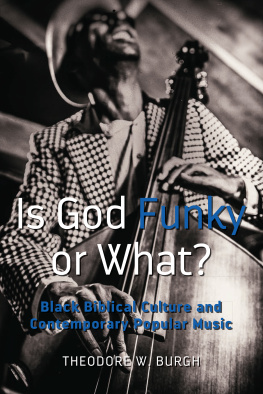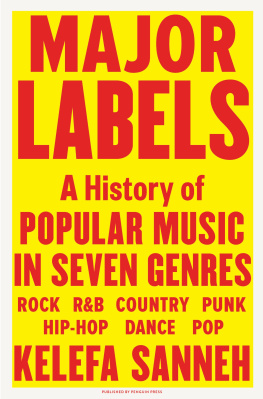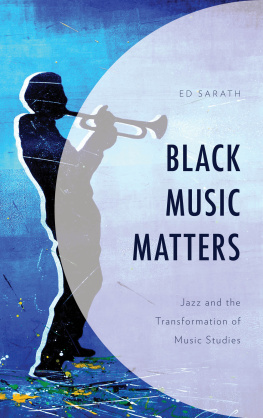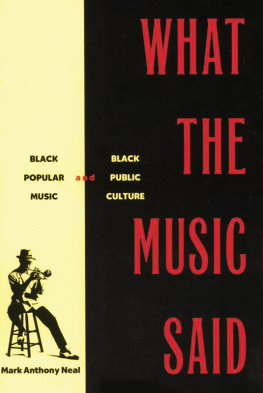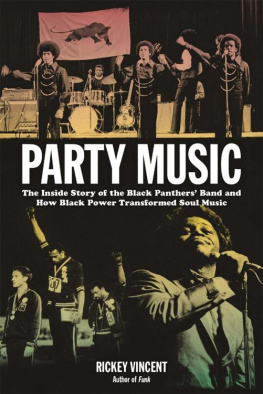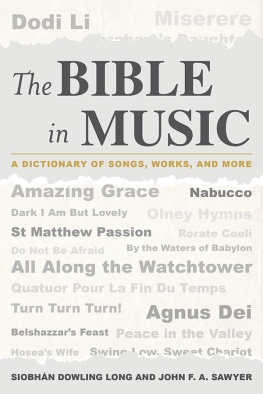
Rochelle Brock and Cynthia Dillard Executive Editors
Vol. 111
The Black Studies and Critical Thinking series is part of the Peter Lang Education list.
Every volume is peer reviewed and meets the highest quality standards for content and production.

PETER LANG
New York Bern Berlin
Brussels Vienna Oxford Warsaw
Theodore W. Burgh
Is God Funky or What?
Black Biblical Culture and Contemporary Popular Music

PETER LANG
New York Bern Berlin
Brussels Vienna Oxford Warsaw
Library of Congress Cataloging-in-Publication Data
Names: Burgh, Theodore W., author.
Title: Is God funky or what?: black biblical culture and contemporary popular music / Theodore W. Burgh. Description: New York: Peter Lang, 2019.
Series: Black studies and critical thinking, vol. 111 | ISSN 1947-5985
Includes bibliographical references and index.
Identifiers: LCCN 2018037621 | ISBN 978-1-4331-4949-8 (hardback: alk. paper)
ISBN 978-1-4331-4948-1 (paperback: alk. paper) | ISBN 978-1-4331-6117-9 (ebook pdf)
ISBN 978-1-4331-6118-6 (epub) | ISBN 978-1-4331-6119-3 (mobi)
Subjects: LCSH: Popular musicReligious aspectsChristianity.
African AmericansMusicHistory and criticism.
Popular musicUnited StatesHistory and criticism.
African AmericansReligion.
Classification: LCC ML3921.8.P67 B87 2019 | DDC 781.64/11208996073dc23
LC record available at https://lccn.loc.gov/2018037621
DOI 10.3726/b14612
Bibliographic information published by Die Deutsche Nationalbibliothek. Die Deutsche Nationalbibliothek lists this publication in the Deutsche Nationalbibliografie; detailed bibliographic data are available on the Internet at http://dnb.d-nb.de/.
2019 Peter Lang Publishing, Inc., New York 29 Broadway, 18th floor, New York, NY 10006
www.peterlang.com
All rights reserved.
Reprint or reproduction, even partially, in all forms such as microfilm,
xerography, microfiche, microcard, and offset strictly prohibited.
About the author
Theodore W. Burgh is a professor at the University of North Carolina Wilmington. He has a BA in music from Hampton University, MA in religious studies from Howard University, and MA and PhD in Near Eastern studies from the University of Arizona. His first book, Listening to the Artifacts, received the Klaus P. Wachsmann Prize from the Society for Ethnomusicology.
About the book
Black music is a powerful art form. Artists creations often go where words cannot. The music is specialsacred. However, its still frequently shoehorned into the ambiguous categories of secular and sacred. Is God Funky or What?: Black Biblical Culture and Contemporary Popular Music complicates the traditional categories of sacred and secular by exposing religious rhetoric and contexts of contemporary popular black music and by revealing the religious-based biblical references and spirituality that form the true cultural context from which these genres emerge. The personal beliefs of black music artists often include, if not revolve around, the heavens. How come we are bombarded by the thank Gods in televised award shows, liner notes, or interviews for songs by musicians that some millennials might call ratchet? Is God Funky or What? shares anecdotes probing connections between specific forms of popular black music and religion. The qualifications of sacred and secular typically depend on context, lyrics, location, and audience (age, race, religion). Through a woven narrative of lyrics, godly acknowledgments, recorded and original interviews, biographies, and recordings from various genres of black music, this book explores how artists have intertwined views of God, perspectives regarding a higher power, spirituality, and religion in creating their music. Their creations make up an organic corpus called the Artistic Black Canon (ABC). Using the ABC, this book shares and explores its remarkable interpretations and ideas about life, music, spirituality, and religion. Is God Funky or What? also shares how we can better make use of this music in the classroom, as well as better understand how essential it is to the lives of many.
This eBook can be cited
This edition of the eBook can be cited. To enable this we have marked the start and end of a page. In cases where a word straddles a page break, the marker is placed inside the word at exactly the same position as in the physical book. This means that occasionally a word might be bifurcated by this marker.

| ROCHELLE BROCK & CYNTHIA DILLARD Executive Editors |
Black Studies and Critical Thinking is an interdisciplinary series which examines the intellectual traditions of and cultural contributions made by people of African de-scent throughout the world. Whether it is in literature, art, music, science, or aca-demics, these contributions are vast and far-reaching. As we work to stretch the boundaries of knowledge and understanding of issues critical to the Black experi-ence, this series offers a unique opportunity to study the social, economic, and political forces that have shaped the historic experience of Black America, and that continue to determine our future. Black Studies and Critical Thinking is positioned at the forefront of research on the Black experience, and is the source for dynamic, innovative, and creative exploration of the most vital issues facing African Ameri-cans. The series invites contributions from all disciplines but is specially suited for cultural studies, anthropology, history, sociology, literature, art, and music.
Subjects of interest include (but are not limited to):
EDUCATION SOCIOLOGY HISTORY MEDIA/COMMUNICATION RELIGION/THEOLOGY WOMENS STUDIES | POLICY STUDIES ADVERTISING AFRICAN AMERICAN STUDIES POLITICAL SCIENCE LGBT STUDIES |
For additional information about this series or for the submission of manuscripts, please contact Dr. Brock (University of North Carolina at Greensboro) at r_brock@uncg.edu or Dr. Dillard (University of Georgia) at cdillard@uga.com.
To order other books in this series, please contact our Customer Service Department:
(800) 770-LANG (within the U.S.)
(212) 647-7706 (outside the U.S.)
(212) 647-7707 FAX
Or browse online by series at www.peterlang.com.
ADVANCE PRAISE FOR
Is God Funky or What?
Anyone who loves black popular music will find this work to be a masterful blend of scholarship, memoir, and nostalgia. Told with warmth and humor, Theodore W. Burgh cites his own musical coming-of-age to argue that secular forms, including jazz, R&B, soul, and hip-hop, have the capacity to trigger experiential outcomes that are decidedly spiritual in nature. He shows how this ostensibly secular music functions as sacred ritual, embellishing and intensifying the kinds of moments that, for many, shape and articulate black identity.

